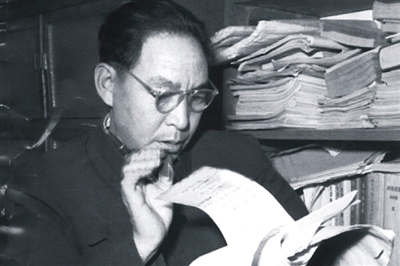Zhao Shuli (1906~1970) was a Chinese novelist and short-story writer.
赵树理(1906~1970),小说家。
Zhao's familiarity with rural life in North China and his fascination with folk literature and art determined the substance and style of his later writings.
赵树理对北方农村生活的熟稔和对民间文学艺术的痴迷决定了他的写作内容和写作风格。
After attending a teachers college, he taught in primary schools.
上了师范之后,赵树理任小学教师。
To supplement his earnings he began writing short stories for local newspapers.
为了补贴家用,赵树理开始给当地的报纸写短篇小说。

A zealous promoter of folk literature and art, he wrote a considerable number of rhythmic talks, mini-tales, and sketches.
赵树理是一个热心促进民间文学艺术的人,写了大量的说唱、小故事和短剧。
He made his name by his short stories "Hsiao Erh-hei chieh-hun" (1943; "Little Blacky's Wedding") and "Li Yu-ts'ai pan-hua" (1943; "The Rhymes of Li Yu-ts'ai").
赵树理的成名作是短篇小说《小二黑结婚》(1943)、《李有才板话》(1943)。
They were followed in 1946 by the novel Li-chia-chuang te pien-ch'ien ("The Changes in Li Village") and the stories "Fu-kuei" ("Lucky"), "Ti-pan" ("Land"), and "Tsui-liang-ch'ai" ("The Tax Collector").
1946年赵树理创作了长篇小说《李家庄的变迁》和短篇小说《福贵》、《地板》和《催粮差》。
His works were widely read and his native humour and grace appreciated by even the barely literate.
赵树理的读者面很大,他民族式的幽默感和气质甚至连文盲也很欣赏。
After 1949 he continued to write prose and edited two magazines.
1949年以后赵树理继续写作散文,并且编辑了两本杂志。
His novel San-li-wan was published in 1955. His style remained easy, plain, and graceful.
赵树理1955年发表《三里湾》,文风仍然是浅显、易懂、优美。
He was the recognized leading writer of the "Shan-yao-tan (Potato) School."
赵树理是公认的“山药蛋派”领袖.
His best-known works have been translated into English, Russian, and Japanese, and his collected works were published in the 1980s.
他的名作已经被翻译成英语、俄语和日语,其选集已于2o世纪80年代出版。












